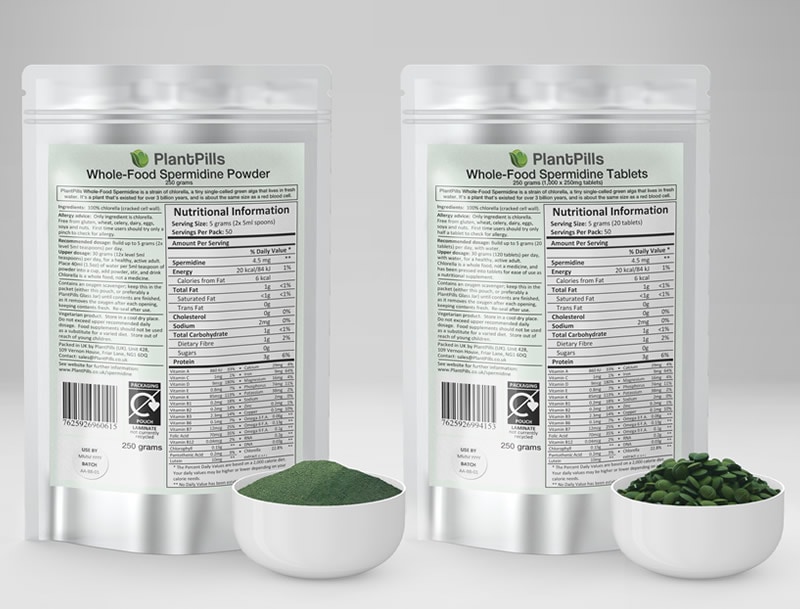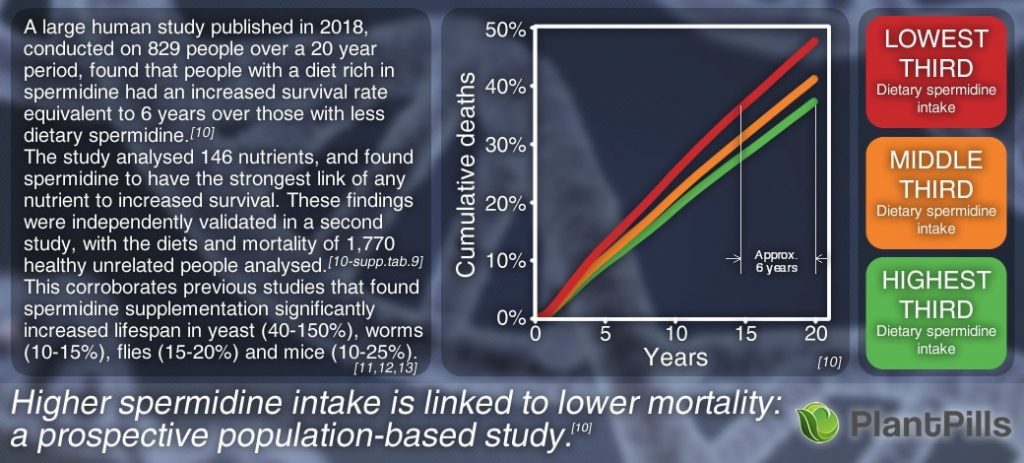
Large study found a diet rich in spermidine has an increased survival rate equivalent to 6 years.
What is spermidine?
Spermidine is the most abundant polyamine in the body, and is essential for tissue regeneration, cell growth and cell proliferation. Spermidine is also critical to the processes involved in controlling apoptosis, learning and memory, and binds to and stabilizes RNA and DNA, modulates enzyme functions, preserves and enhances mitochondrial metabolic function and respiration, and has anti-inflammatory properties and antioxidant functions.
Spermidine is also a natural inducer of autophagy[6], a cytoprotective self-digestive process that assists in removing and recycling damaged and potentially harmful cytoplasmic material that otherwise would accumulate during aging, and is key to health and longevity[7,10].
Spermidine is naturally found in foods such as green peas, chickpeas, cauliflower, broccoli, mushroom and mango in amounts ranging from 25 to 90 mg/kg. Amounts in cheddar cheese, soybean and wheat germ range from 200 to 250 mg/kg[8,9]. The majority of spermidine in standard diets comes from whole grains, apples, pears, salad, vegetable sprouts and potatoes[10]. PlantPills Whole-Food Spermidine has by far the highest spermidine content of any whole food, independently verified to contain over 900 mg/kg (over 0.9mg per gram).
The average person is estimated to consume approximately 10 mg per day[10], though this varies from around 7mg to 25mg or more, with the highest amounts present in the Mediterranean diet, often associated with good health and longevity[19,20,21].
A large human study published in 2018, conducted on 829 people over a 20 year period, found that people with a diet rich in spermidine had an increased survival rate equivalent to 6 years over those with less dietary spermidine[10]. The study analysed 146 nutrients, and found spermidine to have the strongest link of any nutrient to increased survival.
These findings were independently validated in a second study, with the diets and mortality of 1,770 healthy unrelated people analysed[10-supp.tab.9].
This corroborates previous studies that found spermidine supplementation significantly increased lifespan in yeast (40-150%), worms (10-15%), flies (15-20%) and mice (10-25%)[11,12,13].
Tissue spermidine concentrations decline with age[14,15,16,17], which may in part be due to a decline in the biosynthetic activities of polyamine-producing enzymes as they become less efficient[18]. Interestingly, the age-related decline in spermidine levels doesn’t occur in naked mole-rats, that live 10 times longer than other rodent species of the same size[43].
It has been theorised that because the body produces sufficient spermidine during youth, but not in old age, that spermidine evolves to the status of a vitamin and should be supplemented for health maintenance[44].
How does spermidine work?
Spermidine’s ability to induce autophagy accounts for many of the health-promoting effects, due to the key role that autophagy plays in the cellular and molecular mechanisms involved in immune modulation, cardio-protection, neuro-protection, stem cell function and ageing. Alternative mechanisms of action that may be autophagy-independent are direct antioxidant and metabolic effects on increased arginine bioavailability and nitric oxide production, and the MAPK pathway.
Spermidine is classified as a caloric restriction mimetic (CRM)[22]. Calorie restriction (CR) is the chronic reduction of calorie intake without malnutrition, which appears to extend life and be beneficial to health[23,24], due in part to the activation of autophagy to maintain proper cell function and promote cell survival under the stress condition of nutrition deficiency[25].
CRMs potentially mimic the benefits associated with caloric or dietary restriction, in part by inducing autophagy[26].
Another CRM, resveratrol, induces autophagy by indirectly activating the “anti-aging” sirtuin enzyme SIRT1
[27], whereas spermidine primarily induces autophagy through inhibition of the acetyl transferase EP300. EP300 promotes the activity of mTORC1 (autophagy-inhibitory mechanistic target of rapamycin complex 1). Inhibition of EP300 primarily results in autophagy-relevant cytosolic protein deacetylation. Sustained autophagic control by spermidine is mediated through induction of autophagy relevant gene transcription. This involves the regulation of FOXO transcription factor as well as inhibition of histone acetyl transferases, resulting in epigenetic transcriptional reprogramming[22].
Spermidine causes mTORC1 inhibition, but also activates phosphorylation of 5′ adenosine monophosphate-activated protein kinase (AMPK), which may further facilitate autophagic response by antagonizing mTORC1 at the functional level[41].
The combination of spermidine and resveratrol has shown synergistic effects on autophagy induction[28], likely due in part to them initially activating autophagy via different mechanisms.

What are the benefits of spermidine?
Spermidine concentrations in the body decline with age, and increasing dietary spermidine may decrease mortality and increase lifespan, as indicated by studies on humans, yeast, worms, flies and mice. In addition to noting that spermidine levels decline with age, a cross-sectional observational study found that healthy individuals in their 90s and 100s have higher spermidine levels, similar to those found in younger, middle-aged people.
Low spermidine content in breast milk and infant formula has been linked with a higher chance of the child developing food allergies. Spermine content in milk lower than 2 nmol/ml results in an 80% chance of the child developing a food allergy, with the change reduced to 0% with concentrations higher than 13 nmol/ml[30].
In flies, dietary supplementation of spermidine delayed age-associated memory impairment[32], and prevented motor impairment that was elicited by transgenic expression of human α-synuclein[33].
In mice, dietary supplementation of spermidine protected mice from TAR DNA-binding protein TARDBP also known as TDP-43 associated proteinopathies[34], in line with the general neuro-protective action of spermidine.
Apart from extending the lifespan of mice, it exerts cardioprotective effects, reducing cardiac hypertrophy and preserving diastolic function in old mice. Spermidine feeding enhanced cardiac autophagy, mitophagy and mitochondrial respiration, and it also improved the mechano-elastical properties of cardiomyocytes in vivo, coinciding with increased titin phosphorylation and suppressed subclinical inflammation[35].
In Dahl salt-sensitive rats that were fed a high-salt diet (a model for hypertension-induced congestive heart failure), spermidine feeding reduced systemic blood pressure, increased titin phosphorylation and prevented cardiac hypertrophy and a decline in diastolic function, thus delaying the progression to heart failure[35].
Spermidine supplementation in mice also resulted in reduced liver fibrosis and HCC foci[12], and acted as a sleep aid, reversing the age-related lengthening of the circadian period, and modulated the interaction between core-clock genes Cryptochrome Circadian Regulator 1 (CRY1) and Period Circadian Regulator 2 (PER2)[36].
In cultured human hair follicles, spermidine has been found to be a potent stimulator of human hair growth and a modulator of human epithelial stem cell biology[42].
In humans, high levels of dietary spermidine correlate with reduced blood pressure and lower incidence of cardiovascular disease[35].
Why PlantPills spermidine?
Pure spermidine is classified as a research chemical, and cannot be used for human consumption, so spermidine can only be supplemented via whole food or extract sources. PlantPills Whole-Food Spermidine has by far the highest spermidine content of any whole food, independently verified to contain over 900 mg/kg (over 0.9mg per gram). The spermidine content test certificate from the third-party laboratory for the current batch can be seen below.
PlantPills Whole-Food Spermidine is a specific strain of chlorella, a tiny single-celled green alga that lives in fresh water. It’s a plant that is about the same size as a human red blood cell, and has existed on earth for over 3 billion years.
Chlorella is very well studied in humans and animals, and is a dietary staple in some parts of the world, with over 7 million people in Japan consuming chlorella on a daily basis.
Our significant experience and expertise with alga has enabled us to cultivate specific strains, that when grown in the correct conditions[46], result in the highest whole-food source of spermidine in the world.
Every batch of PlantPills Whole-Food Spermidine is independently verified to have a spermidine content of at least 900mg per kg, with no dangerous levels of heavy metals or micro-organisms. The certifications for the current batch are viewable below. The current batch of our Whole-Food Spermidine has a spermidine content of 970 mg per kg.
PlantPills Whole-Food Spermidine comes in powder or 250mg tablets. Pack sizes are 250 grams, 500 grams, 1 kilogram, 2 kilograms and 10 kilograms (selectable in the basket).




